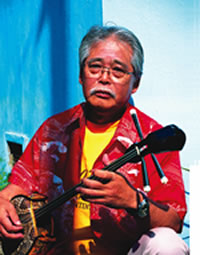Live Booking Agency
 SADAO
CHINA (OKINAWA)
SADAO
CHINA (OKINAWA)
The Legend of Okinawa Island Songs
Generally available, now booking 2010/11
Click here to listen to sound samples and the online shopping page for this artist
Line up:
SADAO CHINA (SANSHIN, VOCALS)
plus 3 accompanying musicians t.b.c.
The extraordinary Sadao China has been at the forefront of Okinawan music for decades. Extremely versatile, he is equally adept at playing classical, traditional folk and modern roots styles. He composed and performed pop hits in the 70s, produced and founded female quartet Nenes (who recorded with Ry Cooder) and has released many acclaimed traditional albums, both as a solo performer and with another legend of traditional music, Seijin Noborikawa. Sadao China plays the sanshin, the three stringed snake skinned banjo at the heart of Okinawan shima uta (island songs) and has a rich voice, steeped in the unique island culture of Okinawa.
Sadao China was born in 1945 in the town of Amagasaki near Osaka. He
is the son of Teihan China, himself an accomplished traditional musician.
He moved to Okinawa as a child and started performing professionally from
the age of 12. In 1978 he released an EP called Akabana featuring the
hit single ‘Bye Bye Okinawa’ that mixed Okinawan music and
Western pop, and became a great influence on the local music scene. At
the same time, he was steadily progressing as a true master of traditional
shima uta, performing live and recording for local Okinawan labels and
Victor in Japan. In 1991 he released a landmark traditional recording
‘Shimauta’ on the same Japanese label as his project that
would be one of his greatest successes as a producer and songwriter, Nenes.
Formed in 1990, the female quartet Nenes, under China’s guidance,
helped to popularize Okinawan music in Japan with classic albums such
as ‘Ikawu’ and ‘Koza Dabasa’ released in 1994
which featured Ry Cooder, Jim Keltner on drums and David Hidalgo from
Los Lobos. From 1995 Sadao China became the director of the Ryukyu Festival,
an popular annual event in Tokyo and Osaka. He subsequently released several
live traditional albums, and in 2004 recorded with a veteran of shima
uta, Seijin Noborikawa. His latest album from 2005, ‘Utamaii’
is his first solo studio recording for fourteen years.